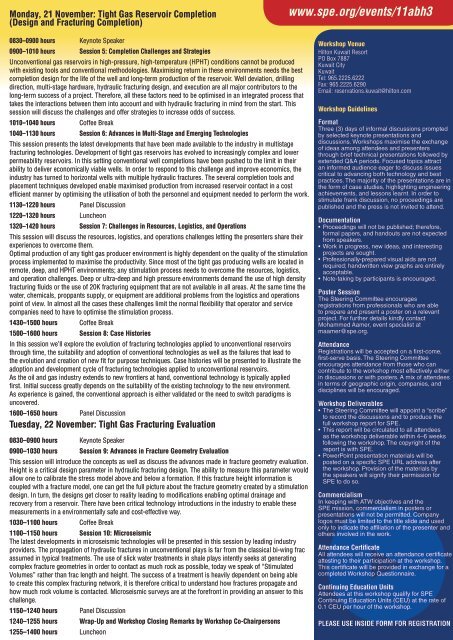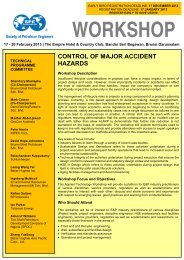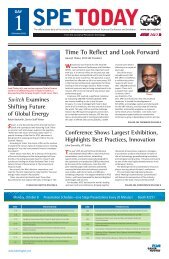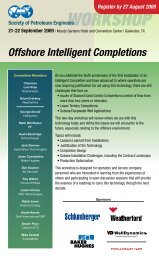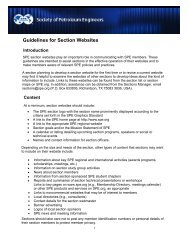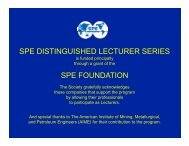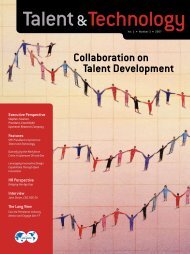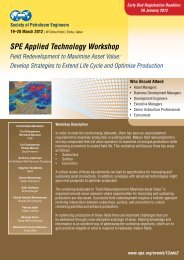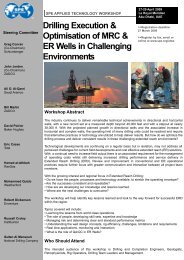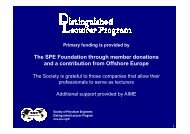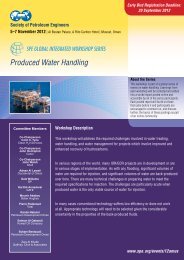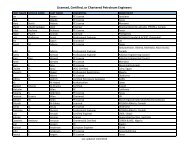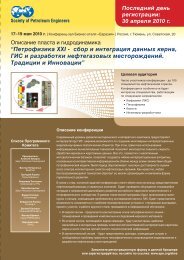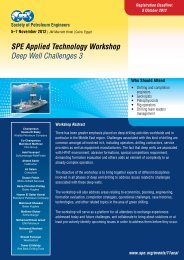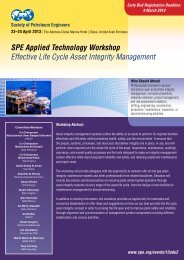Workshop Brochure - Society of Petroleum Engineers
Workshop Brochure - Society of Petroleum Engineers
Workshop Brochure - Society of Petroleum Engineers
You also want an ePaper? Increase the reach of your titles
YUMPU automatically turns print PDFs into web optimized ePapers that Google loves.
Monday, 21 November: Tight Gas Reservoir Completion<br />
(Design and Fracturing Completion)<br />
www.spe.org/events/11abh3<br />
0830–0900 hours Keynote Speaker<br />
0900–1010 hours Session 5: Completion Challenges and Strategies<br />
Unconventional gas reservoirs in high-pressure, high-temperature (HPHT) conditions cannot be produced<br />
with existing tools and conventional methodologies. Maximising return in these environments needs the best<br />
completion design for the life <strong>of</strong> the well and long-term production <strong>of</strong> the reservoir. Well deviation, drilling<br />
direction, multi-stage hardware, hydraulic fracturing design, and execution are all major contributors to the<br />
long-term success <strong>of</strong> a project. Therefore, all these factors need to be optimised in an integrated process that<br />
takes the interactions between them into account and with hydraulic fracturing in mind from the start. This<br />
session will discuss the challenges and <strong>of</strong>fer strategies to increase odds <strong>of</strong> success.<br />
1010–1040 hours C<strong>of</strong>fee Break<br />
1040–1130 hours Session 6: Advances in Multi-Stage and Emerging Technologies<br />
This session presents the latest developments that have been made available to the industry in multistage<br />
fracturing technologies. Development <strong>of</strong> tight gas reservoirs has evolved to increasingly complex and lower<br />
permeability reservoirs. In this setting conventional well completions have been pushed to the limit in their<br />
ability to deliver economically viable wells. In order to respond to this challenge and improve economics, the<br />
industry has turned to horizontal wells with multiple hydraulic fractures. The several completion tools and<br />
placement techniques developed enable maximised production from increased reservoir contact in a cost<br />
efficient manner by optimising the utilisation <strong>of</strong> both the personnel and equipment needed to perform the work.<br />
1130–1220 hours Panel Discussion<br />
1220–1320 hours Luncheon<br />
1320–1420 hours Session 7: Challenges in Resources, Logistics, and Operations<br />
This session will discuss the resources, logistics, and operations challenges letting the presenters share their<br />
experiences to overcome them.<br />
Optimal production <strong>of</strong> any tight gas producer environment is highly dependent on the quality <strong>of</strong> the stimulation<br />
process implemented to maximise the productivity. Since most <strong>of</strong> the tight gas producing wells are located in<br />
remote, deep, and HPHT environments; any stimulation process needs to overcome the resources, logistics,<br />
and operation challenges. Deep or ultra-deep and high pressure environments demand the use <strong>of</strong> high density<br />
fracturing fluids or the use <strong>of</strong> 20K fracturing equipment that are not available in all areas. At the same time the<br />
water, chemicals, proppants supply, or equipment are additional problems from the logistics and operations<br />
point <strong>of</strong> view. In almost all the cases these challenges limit the normal flexibility that operator and service<br />
companies need to have to optimise the stimulation process.<br />
1430–1500 hours C<strong>of</strong>fee Break<br />
1500–1600 hours Session 8: Case Histories<br />
In this session we’ll explore the evolution <strong>of</strong> fracturing technologies applied to unconventional reservoirs<br />
through time, the suitability and adoption <strong>of</strong> conventional technologies as well as the failures that lead to<br />
the evolution and creation <strong>of</strong> new fit for purpose techniques. Case histories will be presented to illustrate the<br />
adoption and development cycle <strong>of</strong> fracturing technologies applied to unconventional reservoirs.<br />
As the oil and gas industry extends to new frontiers at hand, conventional technology is typically applied<br />
first. Initial success greatly depends on the suitability <strong>of</strong> the existing technology to the new environment.<br />
As experience is gained, the conventional approach is either validated or the need to switch paradigms is<br />
uncovered.<br />
1600–1650 hours Panel Discussion<br />
Tuesday, 22 November: Tight Gas Fracturing Evaluation<br />
0830–0900 hours Keynote Speaker<br />
0900–1030 hours Session 9: Advances in Fracture Geometry Evaluation<br />
This session will introduce the concepts as well as discuss the advances made in fracture geometry evaluation.<br />
Height is a critical design parameter in hydraulic fracturing design. The ability to measure this parameter would<br />
allow one to calibrate the stress model above and below a formation. If this fracture height information is<br />
coupled with a fracture model, one can get the full picture about the fracture geometry created by a stimulation<br />
design. In turn, the designs get closer to reality leading to modifications enabling optimal drainage and<br />
recovery from a reservoir. There have been critical technology introductions in the industry to enable these<br />
measurements in a environmentally safe and cost-effective way.<br />
1030–1100 hours C<strong>of</strong>fee Break<br />
1100–1150 hours Session 10: Microseismic<br />
The latest developments in microseismic technologies will be presented in this session by leading industry<br />
providers. The propagation <strong>of</strong> hydraulic fractures in unconventional plays is far from the classical bi-wing frac<br />
assumed in typical treatments. The use <strong>of</strong> slick water treatments in shale plays intently seeks at generating<br />
complex fracture geometries in order to contact as much rock as possible, today we speak <strong>of</strong> “Stimulated<br />
Volumes” rather than frac length and height. The success <strong>of</strong> a treatment is heavily dependent on being able<br />
to create this complex fracturing network, it is therefore critical to understand how fractures propagate and<br />
how much rock volume is contacted. Microseismic surveys are at the forefront in providing an answer to this<br />
challenge.<br />
1150–1240 hours Panel Discussion<br />
1240–1255 hours Wrap-Up and <strong>Workshop</strong> Closing Remarks by <strong>Workshop</strong> Co-Chairpersons<br />
1255–1400 hours Luncheon<br />
<strong>Workshop</strong> Venue<br />
Hilton Kuwait Resort<br />
PO Box 7887<br />
Kuwait City<br />
Kuwait<br />
Tel: 965.2225.6222<br />
Fax: 965.2225.6290<br />
Email: reservations.kuwait@hilton.com<br />
<strong>Workshop</strong> Guidelines<br />
Format<br />
Three (3) days <strong>of</strong> informal discussions prompted<br />
by selected keynote presentations and<br />
discussions. <strong>Workshop</strong>s maximise the exchange<br />
<strong>of</strong> ideas among attendees and presenters<br />
through brief technical presentations followed by<br />
extended Q&A periods. Focused topics attract<br />
an informed audience eager to discuss issues<br />
critical to advancing both technology and best<br />
practices. The majority <strong>of</strong> the presentations are in<br />
the form <strong>of</strong> case studies, highlighting engineering<br />
achievements, and lessons learnt. In order to<br />
stimulate frank discussion, no proceedings are<br />
published and the press is not invited to attend.<br />
Documentation<br />
• Proceedings will not be published; therefore,<br />
formal papers, and handouts are not expected<br />
from speakers.<br />
• Work in progress, new ideas, and interesting<br />
projects are sought.<br />
• Pr<strong>of</strong>essionally-prepared visual aids are not<br />
required; handwritten view graphs are entirely<br />
acceptable.<br />
• Note-taking by participants is encouraged.<br />
Poster Session<br />
The Steering Committee encourages<br />
registrations from pr<strong>of</strong>essionals who are able<br />
to prepare and present a poster on a relevant<br />
project. For further details kindly contact<br />
Mohammed Aamer, event specialist at<br />
maamer@spe.org.<br />
Attendance<br />
Registrations will be accepted on a first-come,<br />
first-serve basis. The Steering Committee<br />
encourages attendance from those who can<br />
contribute to the workshop most effectively either<br />
in discussions or with posters. A mix <strong>of</strong> attendees<br />
in terms <strong>of</strong> geographic origin, companies, and<br />
disciplines will be encouraged.<br />
<strong>Workshop</strong> Deliverables<br />
• The Steering Committee will appoint a “scribe”<br />
to record the discussions and to produce the<br />
full workshop report for SPE.<br />
• This report will be circulated to all attendees<br />
as the workshop deliverable within 4–6 weeks<br />
following the workshop. The copyright <strong>of</strong> the<br />
report is with SPE.<br />
• PowerPoint presentation materials will be<br />
posted on a specific SPE URL address after<br />
the workshop. Provision <strong>of</strong> the materials by<br />
the speakers will signify their permission for<br />
SPE to do so.<br />
Commercialism<br />
In keeping with ATW objectives and the<br />
SPE mission, commercialism in posters or<br />
presentations will not be permitted. Company<br />
logos must be limited to the title slide and used<br />
only to indicate the affiliation <strong>of</strong> the presenter and<br />
others involved in the work.<br />
Attendance Certificate<br />
All attendees will receive an attendance certificate<br />
attesting to their participation at the workshop.<br />
This certificate will be provided in exchange for a<br />
completed <strong>Workshop</strong> Questionnaire.<br />
Continuing Education Units<br />
Attendees at this workshop qualify for SPE<br />
Continuing Education Units (CEU) at the rate <strong>of</strong><br />
0.1 CEU per hour <strong>of</strong> the workshop.<br />
PLEASE USE INSIDE FORM FOR REGISTRATION


